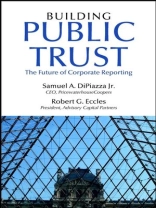Business reporting in a post-apocalypse global marketplace
Clearly, now is the time for creating an effectivebusiness-reporting model appropriate for the markets of thetwenty-first century. Rather than start from scratch after the Enron-Andersen fiasco, two leading consultants from Pricewaterhouse Coopers present a plan that supplements the currentmodel, one in which executives, accountants, analysts, investors, regulators, and other stakeholders can truly embrace the spirit oftransparency. The Future of Corporate Reporting highlights the bestpractices for global financial reporting, explaining the concept of’performance auditing, ‘ which focuses on the real performance ofthe business as opposed to technical adherence to GAAS. Eccles and Masterson also discuss the pros and cons of GAAP v. IAS, presentnew approaches to reforming financial reporting, and outline atwenty-first-century model of accounting that will improve marketsand benefit shareholders.
Inhoudsopgave
Foreword.
Preface.
Subject Matter Experts.
Acknowledgments.
Prologue.
Three Tiers.
Accounting Standards.
Industry Standards.
Good Management.
Corporate Reporting.
The Internet.
Future Audits.
Epilogue.
Index.
Over de auteur
SAMUEL A. Di PIAZZA jr. is the CEO of Pricewaterhouse Coopers, theglobal professional services firm with some 150, 000 employees, operating in virtually every country worldwide. Mr. Di Piazza hasenjoyed a long career with Pricewaterhouse Coopers, which he joinedin 1973. He most recently served as Senior Partner and Chairman ofthe U.S. firm with executive responsibility for U.S.operations.
ROBERT G. ECCLES is founder and president of Advisory Capital Partners, Inc. (ACP), and a Senior Fellow of Pricewaterhouse Coopers. Since 1993, ACP has provided strategic, financial, and organizational advisory services to both largecompanies and fast-growing small and medium-sized ones. Prior tofounding ACP, Dr. Eccles was a full professor at Harvard Business School, where he was a faculty member for fourteen years, receivingtenure in 1989.












